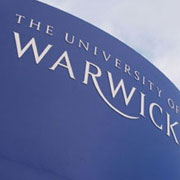MANUFACTURING
New £3.5m supercomputing investment set to boost region’s competitiveness
A £3.5 million supercomputing hub is set to power growth and innovation in the Midlands and London by opening up its vast number-crunching power to local firms.
The University of Warwick is leading a group of four top universities to launch MidPlus, a state-of-the–art high-performance computing centre, to help SMEs and larger firms with the modelling, simulation and analysis needed to design world-leading products and services.
MidPlus will provide extra computing capacity to sectors such as aerospace, automotive, biomedical and advanced materials as well as delivering supercomputing skills to the local workforce.
The investment consists of £2 million from the research funding agency EPSRC and £1.5 million from the four partners – University of Warwick, University of Birmingham, University of Nottingham and Queen Mary, University of London.
The move is linked to a Government drive to increase the UK’s capacity to exploit high-performance computing in optimising process design – a key requirement to boost industries such as advanced manufacturing, scientific research and financial services.
The new centre’s facilities will be available to businesses along the M1/M6 corridor in the East and West Midlands and London.
As well as offering significantly increased capacity to local firms, Midplus will also deliver consultancy and training services which tap into the universities’ combined expertise in high-performance computing.
Director of Midplus Professor Mark Rodger said: “The ability to simulate complex processes and interrogate large datasets is the hidden motor behind much of the UK’s industrial base.
“In the Midlands and London, key industries such as aerospace, automotive and advanced materials rely on high-level supercomputing power to develop new products.
“The large set-up cost to exploit high-performance computing, both in terms of equipment and expertise, can be a major barrier to SMEs expanding into newer or bigger markets so MidPlus will make it easier for them to step up into the next league.
“It is vital that the UK maintains its investment in e-infrastructure in order to compete on a global scale - that’s why Midplus is set to provide such a far-reaching boost to established and emerging industries in the Midlands and London.”
MidPlus will significantly extend the current computing power available within the region’s universities.
The University of Warwick will increase its current capacity to give a 6,000 core cluster by the summer with very rapid communication between the cores, which will allow it to deal with very large, realistic simulations quickly and efficiently.
The upgrade to its existing server and storage cluster was provided by OCF, the high performance data processing, data management and data storage integrator.
This capability is needed to increase resolution in engineering process design and fluid dynamics models, to improve the realism of pharmaceutical modelling and to allow greater complexity in analysing and predicting the properties of advanced materials.
A high-throughput 2,900-core cluster at Queen Mary is designed to provide significant capacity for tasks that involve running large numbers of simulations with different parameters or data sets.
These will be particularly useful for SMEs that need to consider many different scenarios to identify optimal design, process or market conditions.
A very large file store and data archive is being established at Birmingham and Nottingham, mirrored between the two sites to maintain the safety and integrity of the data.
This file store will enable research data bases generated at the partner universities to be made accessible to SMEs and established industries, and will also provide a commercially-secure route for such industries to store—or commercialise—their own in-house databases.



 How to resolve AdBlock issue?
How to resolve AdBlock issue?